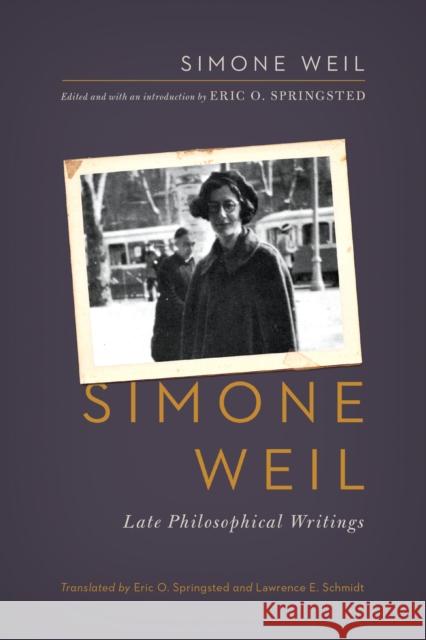Simone Weil: Late Philosophical Writings » książka
Simone Weil: Late Philosophical Writings
ISBN-13: 9780268041502 / Angielski / Miękka / 2015 / 214 str.
Simone Weil: Late Philosophical Writings
ISBN-13: 9780268041502 / Angielski / Miękka / 2015 / 214 str.
(netto: 69,78 VAT: 5%)
Najniższa cena z 30 dni: 72,82
ok. 22 dni roboczych.
Darmowa dostawa!
Although trained as a philosopher, Simone Weil (1909-43) contributed to a wide range of subjects, resulting in a rich field of interdisciplinary Weil studies. Yet those coming to her work from such disciplines as sociology, history, political science, religious studies, French studies, and women's studies are often ignorant of or baffled by her philosophical investigations. In Simone Weil: Late Philosophical Writings, Eric O. Springsted presents a unique collection of Weil's writings, one concentrating on her explicitly philosophical thinking. The essays are drawn chiefly from the time Weil spent in Marseille in 1940-42, as well as one written from London; most have been out of print for some time; three appear for the first time; all are newly translated. Beyond making important texts available, this selection provides the context for understanding Weil's thought as a whole. This volume is important not only for those with a general interest in Weil; it also specifically presents Weil as a philosopher, chiefly one interested in questions of the nature of value, moral thought, and the relation of faith and reason. What also appears through this judicious selection is an important confirmation that on many issues respecting the nature of philosophy, Weil, Wittgenstein, and Kierkegaard shared a great deal.
Although trained as a philosopher, Simone Weil (1909-43) contributed to a wide range of subjects, resulting in a rich field of interdisciplinary Weil studies. Yet those coming to her work from such disciplines as sociology, history, political science, religious studies, French studies, and womens studies are often ignorant of or baffled by her philosophical investigations. In Simone Weil: Late Philosophical Writings, Eric O. Springsted presents a unique collection of Weils writings, one concentrating on her explicitly philosophical thinking. The essays are drawn chiefly from the time Weil spent in Marseille in 1940-42, as well as one written from London; most have been out of print for some time; three appear for the first time; all are newly translated. Beyond making important texts available, this selection provides the context for understanding Weils thought as a whole. This volume is important not only for those with a general interest in Weil; it also specifically presents Weil as a philosopher, chiefly one interested in questions of the nature of value, moral thought, and the relation of faith and reason. What also appears through this judicious selection is an important confirmation that on many issues respecting the nature of philosophy, Weil, Wittgenstein, and Kierkegaard shared a great deal.











